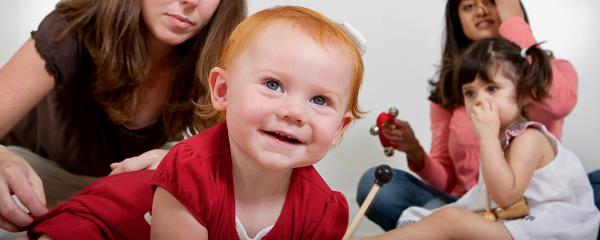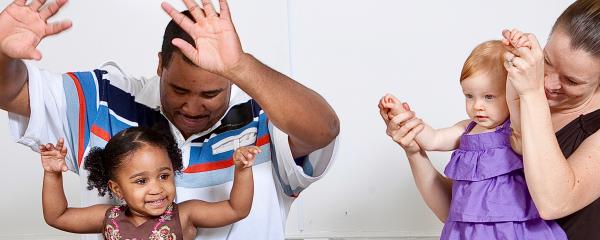Common questions from parents
FAQ
What’s the point of coming to class if my child is too shy to sing in class?
QuestionWhat’s the point of coming to class if my child is too shy to sing in class?AnswerConsider the wonderful first years of life as a time for musical development and musical fun. Please do not get confused between learning music and musical performance. A child’s temperament may dictate whether he or she will want to sing out loud in class. Parental pressure to perform in class might only make the child uncomfortable, and may take away from the relaxed environment in which young children learn best. Children learn through exposure in a fun environment and need the freedom to experiment on their own. Instead of assessing your child’s learning by how he or she “performs” in class, rest assured that if your child enjoys coming to class and enjoys doing the songs and activities with you at home that he or she is learning in as natural a way as possible. Remember, if your child sings at home and not in class - that’s OK!
When should my child start taking instrument lessons?
QuestionWhen should my child start taking instrument lessons?AnswerBefore starting instrumental instruction, a child should achieve “independent music accuracy.” Independent music accuracy, which can be attained by all typically developing children, is defined as the ability to sing in tune and in rhythm, and to make rhythmically accurate movements. With proper musical stimulation, this usually occurs between the ages of four and six.
The tonal and rhythm skills they learn during the first years of life will give them the ability to learn to play an instrument with greater ease and enjoyment later in life.
Why do your programs involve parents and caregivers?
QuestionWhy do your programs involve parents and caregivers?AnswerParents and other primary care givers play a critical role in their child’s music development. We not only provide parents with music and activities to take home and repeat throughout the week, but we also encourage meaningful social interaction around the music.
MIRROR: Observe closely and acknowledge your child’s emerging musical expressiveness. When you see your child doing something new, imitate and enlarge upon those ideas to reinforce your child’s creativity.
MODEL: Provide a shining example by modeling an enthusiastic engagement with music. Adapt the songs to suit your everyday routines and create musical conversations with your child.
TOUCH: Physical touch provides powerful stimulation to neural pathways. Bounce, lift, tickle and dance during music time.
Will your classes help to make my child smarter?
QuestionAnswerThere’s a growing body of research suggesting that early exposure to music not only enhances your child's ability to create and enjoy music, but increases brain plasticity. Plasticity is flexibility in brain function and enhances many aspects of brain activity, and also facilitates recovery from brain injury.
Should babies wait until they can walk before taking classes
QuestionMy baby is 4 months old. Can she benefit from class now, or should I wait until she can walk?AnswerThere is a growing body of research to that suggests the younger a child is, the more he or she is learning. Even though a baby cannot run, clap or sing in class, their brain is developing at a faster rate than the brains of the big kids. Additionally, research suggests that during the second 6 months of life the brain is already prioritizing: discarding the neural information pathways not stimulated by its environment. So yes, the best possible time to start The Music Class is when your child is a baby!
Another way to think of this is to compare learning to speak with learning music. In the same way that talking to your baby from birth is critical to your child’s language development, exposing your child to music from birth benefits her music development. Of course your baby cannot show you how much she is learning now. Be patient! Let her feel the beat, listen to you sing, and observe in class. Absorbing musical sounds is the first step in music development. When she becomes a toddler she will surely blossom. Then you will see first hand the benefits of coming to class during that precious first year.


